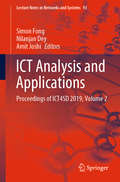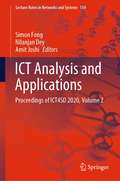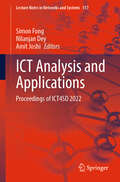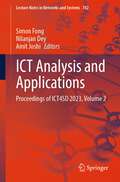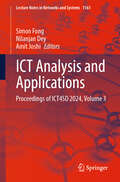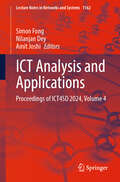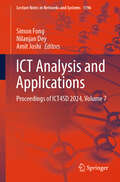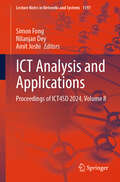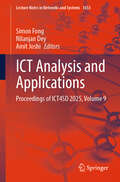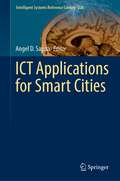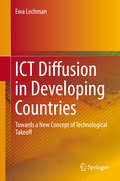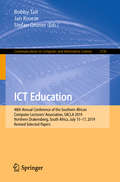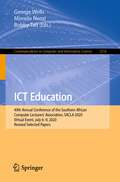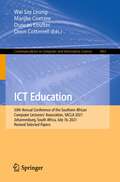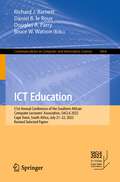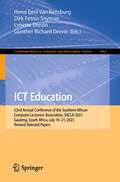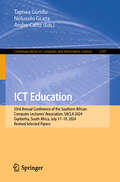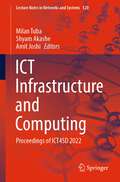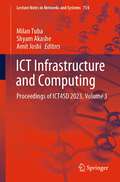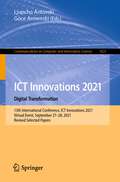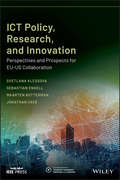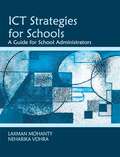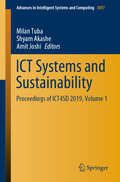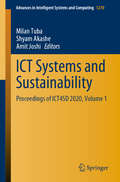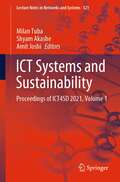- Table View
- List View
ICT Analysis and Applications: Proceedings of ICT4SD 2019, Volume 2 (Lecture Notes in Networks and Systems #93)
by Nilanjan Dey Amit Joshi Simon FongThis book proposes new technologies and discusses future solutions for ICT design infrastructures, as reflected in high-quality papers presented at the 4th International Conference on ICT for Sustainable Development (ICT4SD 2019), held in Goa, India, on 5–6 July 2019. The conference provided a valuable forum for cutting-edge research discussions among pioneering researchers, scientists, industrial engineers, and students from all around the world. Bringing together experts from different countries, the book explores a range of central issues from an international perspective.
ICT Analysis and Applications: Proceedings of ICT4SD 2020, Volume 2 (Lecture Notes in Networks and Systems #154)
by Nilanjan Dey Amit Joshi Simon FongThis book proposes new technologies and discusses future solutions for ICT design infrastructures, as reflected in high-quality papers presented at the 5th International Conference on ICT for Sustainable Development (ICT4SD 2020), held in Goa, India, on 23–24 July 2020. The conference provided a valuable forum for cutting-edge research discussions among pioneering researchers, scientists, industrial engineers, and students from all around the world. Bringing together experts from different countries, the book explores a range of central issues from an international perspective.
ICT Analysis and Applications: Proceedings of ICT4SD 2022 (Lecture Notes in Networks and Systems #517)
by Nilanjan Dey Amit Joshi Simon FongThis book proposes new technologies and discusses future solutions for ICT design infrastructures, as reflected in high-quality papers presented at the 7th International Conference on ICT for Sustainable Development (ICT4SD 2022), held in Goa, India, on July 29–30, 2022. The book covers the topics such as big data and data mining, data fusion, IoT programming toolkits and frameworks, green communication systems and network, use of ICT in smart cities, sensor networks and embedded system, network and information security, wireless and optical networks, security, trust, and privacy, routing and control protocols, cognitive radio and networks, and natural language processing. Bringing together experts from different countries, the book explores a range of central issues from an international perspective.
ICT Analysis and Applications: Proceedings of ICT4SD 2023, Volume 2 (Lecture Notes in Networks and Systems #782)
by Nilanjan Dey Amit Joshi Simon FongThis book proposes new technologies and discusses future solutions for ICT design infrastructures, as reflected in high-quality papers presented at the 8th International Conference on ICT for Sustainable Development (ICT4SD 2023), held in Goa, India, on August 3–4, 2023. The book covers the topics such as big data and data mining, data fusion, IoT programming toolkits and frameworks, green communication systems and network, use of ICT in smart cities, sensor networks and embedded system, network and information security, wireless and optical networks, security, trust, and privacy, routing and control protocols, cognitive radio and networks, and natural language processing. Bringing together experts from different countries, the book explores a range of central issues from an international perspective.
ICT Analysis and Applications: Proceedings of ICT4SD 2024, Volume 3 (Lecture Notes in Networks and Systems #1161)
by Nilanjan Dey Amit Joshi Simon FongThis book proposes new technologies and discusses future solutions for ICT design infrastructures, as reflected in high-quality papers presented at the 8th International Conference on ICT for Sustainable Development (ICT4SD 2024), held in Goa, India, on 8–9 August 2024. The book covers the topics such as big data and data mining, data fusion, IoT programming toolkits and frameworks, green communication systems and network, use of ICT in smart cities, sensor networks and embedded system, network and information security, wireless and optical networks, security, trust, and privacy, routing and control protocols, cognitive radio and networks, and natural language processing. Bringing together experts from different countries, the book explores a range of central issues from an international perspective.
ICT Analysis and Applications: Proceedings of ICT4SD 2024, Volume 4 (Lecture Notes in Networks and Systems #1162)
by Nilanjan Dey Amit Joshi Simon FongThis book proposes new technologies and discusses future solutions for ICT design infrastructures, as reflected in high-quality papers presented at the 8th International Conference on ICT for Sustainable Development (ICT4SD 2024), held in Goa, India, on 8–9 August 2024. The book covers the topics such as big data and data mining, data fusion, IoT programming toolkits and frameworks, green communication systems and network, use of ICT in smart cities, sensor networks and embedded system, network and information security, wireless and optical networks, security, trust, and privacy, routing and control protocols, cognitive radio and networks, and natural language processing. Bringing together experts from different countries, the book explores a range of central issues from an international perspective.
ICT Analysis and Applications: Proceedings of ICT4SD 2024, Volume 7 (Lecture Notes in Networks and Systems #1196)
by Nilanjan Dey Amit Joshi Simon FongThis book proposes new technologies and discusses future solutions for ICT design infrastructures, as reflected in high-quality papers presented at the 8th International Conference on ICT for Sustainable Development (ICT4SD 2024), held in Goa, India, on 8–9 August 2024. The book covers the topics such as big data and data mining, data fusion, IoT programming toolkits and frameworks, green communication systems and network, use of ICT in smart cities, sensor networks and embedded system, network and information security, wireless and optical networks, security, trust, and privacy, routing and control protocols, cognitive radio and networks, and natural language processing. Bringing together experts from different countries, the book explores a range of central issues from an international perspective.
ICT Analysis and Applications: Proceedings of ICT4SD 2024, Volume 8 (Lecture Notes in Networks and Systems #1197)
by Nilanjan Dey Amit Joshi Simon FongThis book proposes new technologies and discusses future solutions for ICT design infrastructures, as reflected in high-quality papers presented at the 8th International Conference on ICT for Sustainable Development (ICT4SD 2024), held in Goa, India, on 8–9 August 2024. The book covers the topics such as big data and data mining, data fusion, IoT programming toolkits and frameworks, green communication systems and network, use of ICT in smart cities, sensor networks and embedded system, network and information security, wireless and optical networks, security, trust, and privacy, routing and control protocols, cognitive radio and networks, and natural language processing. Bringing together experts from different countries, the book explores a range of central issues from an international perspective.
ICT Analysis and Applications: Proceedings of ICT4SD 2025, Volume 9 (Lecture Notes in Networks and Systems #1653)
by Nilanjan Dey Amit Joshi Simon FongThis book proposes new technologies and discusses future solutions for ICT design infrastructures, as reflected in high-quality papers presented at the 10th International Conference on ICT for Sustainable Development (ICT4SD 2025), held in Goa, India, on 17–19 July 2025. The book covers topics such as big data and data mining, data fusion, IoT programming toolkits and frameworks, green communication systems and network, use of ICT in smart cities, sensor networks and embedded system, network and information security, wireless and optical networks, security, trust, and privacy, routing and control protocols, cognitive radio and networks, and natural language processing. Bringing together experts from different countries, the book explores a range of central issues from an international perspective.
ICT Applications for Smart Cities (Intelligent Systems Reference Library #224)
by Angel D. SappaThis book is the result of four-year work in the framework of the Ibero-American Research Network TICs4CI funded by the CYTED program. In the following decades, 85% of the world's population is expected to live in cities; hence, urban centers should be prepared to provide smart solutions for problems ranging from video surveillance and intelligent mobility to the solid waste recycling processes, just to mention a few. More specifically, the book describes underlying technologies and practical implementations of several successful case studies of ICTs developed in the following smart city areas: • Urban environment monitoring • Intelligent mobility • Waste recycling processes • Video surveillance • Computer-aided diagnose in healthcare systems • Computer vision-based approaches for efficiency in production processes The book is intended for researchers and engineers in the field of ICTs for smart cities, as well as to anyone who wants to know about state-of-the-art approaches and challenges on this field.
ICT Diffusion in Developing Countries
by Ewa LechmanThis book provides an extensive overview of the diffusion of Information and Communication Technologies (ICTs) in developing countries between 2000 and 2012. It covers issues such as country-specific ICT diffusion patterns, technological substitution and technological convergence. By identifying social, economic and institutional prerequisites and analyzing critical country-specific conditions, the author develops a new approach to explaining the emergence of their technological takeoff. Readers will discover how developing countries are now adopting ICTs, rapidly catching up with the developed world in terms of ICT access and use.
ICT Education: 48th Annual Conference of the Southern African Computer Lecturers’ Association, SACLA 2019, Northern Drakensberg, South Africa, July 15–17, 2019, Revised Selected Papers (Communications in Computer and Information Science #1136)
by Stefan Gruner Bobby Tait Jan KroezeThis book constitutes the refereed proceedings of the 48th Annual Conference of the Southern African Computer Lecturers' Association on ICT Education, SACLA 2019, held in Northern Drakensberg, South Africa, in July 2019. The 16 revised full papers presented were carefully reviewed and selected from 57 submissions. The papers are organized in following topical sections: computer programming education; system security education; software engineering education; education of post-graduate research-students; our students, our profession.
ICT Education: 49th Annual Conference of the Southern African Computer Lecturers' Association, SACLA 2020, Virtual Event, July 6–9, 2020, Revised Selected Papers (Communications in Computer and Information Science #1518)
by Bobby Tait George Wells Monelo NxoziThis book constitutes the refereed proceedings of the 49th Annual Conference of the Southern African Computer Lecturers' Association on ICT Education, SACLA 2019, held in a virtual mode in South Africa, in July 2020. The 13 revised full papers presented were carefully reviewed and selected from 55 submissions. The papers focus on practical experiences in computing education, novel tools for learning and/or assessment, and research investigating aspects of computing education.
ICT Education: 50th Annual Conference of the Southern African Computer Lecturers' Association, SACLA 2021, Johannesburg, South Africa, July 16, 2021, Revised Selected Papers (Communications in Computer and Information Science #1461)
by Marijke Coetzee Wai Sze Leung Duncan Coulter Deon CotterrellThis book constitutes the refereed proceedings of the 50th Annual Conference of the Southern African Computer Lecturers' Association on ICT Education, SACLA 2021, held in Johannesburg, South Africa in July 2021. The 9 revised full papers presented were carefully reviewed and selected fromthe 23 submissions. One invited paper was also included in this volume. The papers are organized in following topical sections: past, present and future; teaching innovation; teaching methods and strategies.
ICT Education: 51st Annual Conference of the Southern African Computer Lecturers' Association, SACLA 2022, Cape Town, South Africa, July 21–22, 2022, Revised Selected Papers (Communications in Computer and Information Science #1664)
by Bruce W. Watson Richard J. Barnett Daniel B. le Roux Douglas A. ParryThis book constitutes the refereed proceedings of the 51st Annual Conference of the Southern African Computer Lecturers' Association, SACLA 2022, held in Cape Town, South Africa, during July 21–22, 2022.The 10 full papers were included in this book were carefully reviewed and selected from 31 submissions. They were organized in topical sections as follows: curriculum; assessment; teaching in context; innovative teaching; and pandemic pedagogy.
ICT Education: 52nd Annual Conference of the Southern African Computer Lecturers' Association, SACLA 2023, Gauteng, South Africa, July 19–21, 2023, Revised Selected Papers (Communications in Computer and Information Science #1862)
by Lynette Drevin Henri Emil Van Rensburg Dirk Petrus Snyman Günther Richard DrevinThis book constitutes the refereed proceedings of the 52nd Annual Conference of the Southern African Computer Lecturers' Association on ICT Education, SACLA 2023, held in Gauteng, South Africa, during July 19–21, 2023. The 12 full papers included in this book were carefully reviewed and selected from 42 submissions. They were organized in topical sections as follows: student centered teaching and learning; AI and future movements; programming; and beyond the classroom.
ICT Education: 53rd Annual Conference of the Southern African Computer Lecturers' Association, SACLA 2024, Gqeberha, South Africa, July 17–19, 2024, Revised Selected Papers (Communications in Computer and Information Science #2397)
by Tapiwa Gundu Noluxolo Gcaza Andre CalitzThis book constitutes the refereed proceedings of the 53rd Annual Conference of the Southern African Computer Lecturers' Association on ICT Education, SACLA 2024, held in Gqeberha, South Africa, during July 17–19, 2024. The 10 full papers included in this book were carefully reviewed and selected from 53 submissions. The SACLA 2024 conference served as a distinguished platform for exchanging original research and practical experiences, fostering dialogue on the teaching and learning of Information Systems, Computer Science, Information Technology and related disciplines.
ICT Infrastructure and Computing: Proceedings of ICT4SD 2022 (Lecture Notes in Networks and Systems #520)
by Amit Joshi Shyam Akashe Milan TubaThis book proposes new technologies and discusses future solutions for ICT design infrastructures, as reflected in high-quality papers presented at the 7th International Conference on ICT for Sustainable Development (ICT4SD 2022), held in Goa, India, on 29–30 July 2022. The book covers the topics such as big data and data mining, data fusion, IoT programming toolkits and frameworks, green communication systems and network, use of ICT in smart cities, sensor networks and embedded system, network and information security, wireless and optical networks, security, trust, and privacy, routing and control protocols, cognitive radio and networks, and natural language processing. Bringing together experts from different countries, the book explores a range of central issues from an international perspective.
ICT Infrastructure and Computing: Proceedings of ICT4SD 2023, Volume 3 (Lecture Notes in Networks and Systems #754)
by Amit Joshi Shyam Akashe Milan TubaThis book proposes new technologies and discusses future solutions for ICT design infrastructures, as reflected in high-quality papers presented at the 8th International Conference on ICT for Sustainable Development (ICT4SD 2023), held in Goa, India, on August 3–4, 2023. The book covers the topics such as big data and data mining, data fusion, IoT programming toolkits and frameworks, green communication systems and network, use of ICT in smart cities, sensor networks and embedded system, network and information security, wireless and optical networks, security, trust, and privacy, routing and control protocols, cognitive radio and networks, and natural language processing. Bringing together experts from different countries, the book explores a range of central issues from an international perspective.
ICT Innovations 2021. Digital Transformation: 13th International Conference, ICT Innovations 2021, Virtual Event, September 27–28, 2021, Revised Selected Papers (Communications in Computer and Information Science #1521)
by Ljupcho Antovski Goce ArmenskiThis book constitutes the refereed proceedings of the 13th International ICT Innovations Conference, ICT Innovations 2021, held as virtual event in September 2021.The 15 full papers presented were carefully reviewed and selected from 58 submissions. The papers are organized in topical sections on deep learning and AI; NLP and social network analysis; theoretical foundations and information security; e-services; sensor systems, IoT.
ICT Policy, Research, and Innovation: Perspectives and Prospects for EU-US Collaboration (IEEE Press Series on Technology Management, Innovation, and Leadership)
by Jonathan Cave Sebastian Engell Svetlana Klessova Maarten BottermanA comprehensive discussion of the findings of the PICASSO initiative on ICT policy ICT Policy, Research, and Innovation: Perspectives and Prospects for EU-US Collaboration provides a clearly readable overview of selected information and communication technology (ICT) and policy topics. Rather than deluge the reader with technical details, the distinguished authors provide just enough technical background to make sense of the underlying policy discussions. The book covers policy, research, and innovation topics on technologies as wide-ranging as: Internet of Things Cyber physical systems 5G Big data ICT Policy, Research, and Innovation compares and contrasts the policy approaches taken by the EU and the US in a variety of areas. The potential for future cooperation is outlined as well. Later chapters provide policy perspectives about some major issues affecting EU/US development cooperation, while the book closes with a discussion of how the development of these new technologies is changing our conceptions of fundamental aspects of society.
ICT Strategies for Schools: A Guide for School Administrators
by Laxman Mohanty Neharika VohraRecognizing the potential of ICTs to make the classroom transaction of curriculum significantly more relevant and purposeful, principals and school administrators in India need to design appropriate IT strategies and oversee the entire implementation process in their schools. This book is guide to the use of ICT in schools, covering issues of pedagogy, curriculum and learning. In brief, it deals with - Education uses of IT - Criteria for selection of hardware and software - Designing an IT-assisted curriculum - Teacher recruitment, training and desired competencies - Management and financial issues - Possible problem areas: plagiarism, privacy, hacking Lucidly written, with case studies highlighting successful strategies, this volume will be of immense importance to principals and administrators of schools as also students of education.
ICT Systems and Sustainability: Proceedings of ICT4SD 2019, Volume 1 (Advances in Intelligent Systems and Computing #1077)
by Amit Joshi Shyam Akashe Milan TubaThis book proposes new technologies and discusses future solutions for ICT design infrastructures, as reflected in high-quality papers presented at the 4th International Conference on ICT for Sustainable Development (ICT4SD 2019), held in Goa, India, on 5–6 July 2019. The conference provided a valuable forum for cutting-edge research discussions among pioneering researchers, scientists, industrial engineers, and students from all around the world. Bringing together experts from different countries, the book explores a range of central issues from an international perspective.
ICT Systems and Sustainability: Proceedings of ICT4SD 2020, Volume 1 (Advances in Intelligent Systems and Computing #1270)
by Amit Joshi Shyam Akashe Milan TubaThis book proposes new technologies and discusses future solutions for ICT design infrastructures, as reflected in high-quality papers presented at the 5th International Conference on ICT for Sustainable Development (ICT4SD 2020), held in Goa, India, on 23–24 July 2020. The conference provided a valuable forum for cutting-edge research discussions among pioneering researchers, scientists, industrial engineers, and students from all around the world. Bringing together experts from different countries, the book explores a range of central issues from an international perspective.
ICT Systems and Sustainability: Proceedings of ICT4SD 2021, Volume 1 (Lecture Notes in Networks and Systems #321)
by Amit Joshi Shyam Akashe Milan TubaThis book proposes new technologies and discusses future solutions for ICT design infrastructures, as reflected in high-quality papers presented at the 6th International Conference on ICT for Sustainable Development (ICT4SD 2021), held in Goa, India, on 5–6 August 2021. The book covers the topics such as big data and data mining, data fusion, IoT programming toolkits and frameworks, green communication systems and network, use of ICT in smart cities, sensor networks and embedded system, network and information security, wireless and optical networks, security, trust, and privacy, routing and control protocols, cognitive radio and networks, and natural language processing. Bringing together experts from different countries, the book explores a range of central issues from an international perspective.
